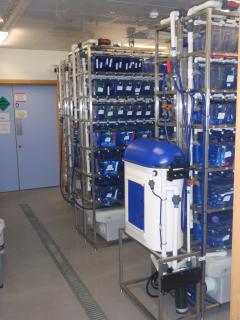About Us
The history of the BVS Aquatics Unit and information on the services we provide to researchers at the University of Edinburgh
The importance of the establishment of a world-class zebrafish facility was recognised by the College of Medicine and Veterinary Medicine who initially committed significant funding towards this aim. This commitment is not only reflected in the importance of current research underway at Edinburgh that utilise the zebrafish model, but also highlighted in the importance of plans in the immediate future to establish the University as a centre of excellence in zebrafish research.

The BVS Zebrafish Facility was established in 2005 and is housed in the multi-centred institute of the University of Edinburgh; this facility supports studies that utilise zebrafish for projects in cardiovascular science, neuroregeneration, inflammation research, integrative physiology and regenerative medicine. The BVS zebrafish facility is supported by The University of Edinburgh, Bioresearch & Veterinary Services (BVS) department; all animals are maintained in accordance with A(SP)A '86 and Directive 2010/63EU.
Zebrafish (Danio rerio) has now been clearly established as an extremely valuable research model organism in the field of human disease. The advantages of using this model species, together with its compliance to the 3R’s and significant cost savings, are reflected in the exponential increase in the number of zebrafish-related scientific publications. The significant number of zebrafish studies being undertaken globally has clearly established the importance of zebrafish over the last two decades.
It may seem a peculiarity to use zebrafish for medical research of human disease studies, however fundamental processes of human biology are replicated at the cellular and genetic level, which makes the zebrafish an important medical research tool. Zebrafish also have some unique capabilities, .i.e. the ability to regenerate all organs and to survive without a cardiovascular system for several days! Two current regenerative studies examine spinal and heart regeneration; studies that could, alongside other on-going studies, have a significant impact on human health. Other studies include pharmatoxicology, resolution of inflammation and organ development and function.

